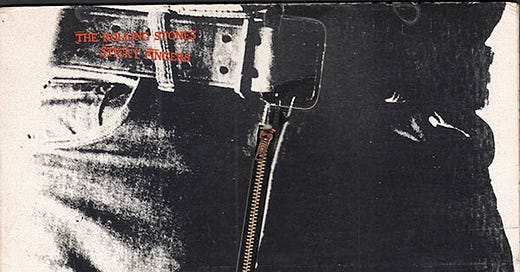When we talked about Led Zeppelin’s ‘Bring It On Home’, the last track on Led Zeppelin II, it seemed that it was a song that was underrated within their catalogue. The same is true for the closer to Sticky Fingers - ‘Moonlight Mile’.
On paper, the subject matter should be enough to put anyone off. A fabulously wealthy rock star writing a song about how tough life is on the road is a sub-genre with a mixed reputation. This, however, is on the better end of that spectrum because Mick Jagger nails a more general feeling of loneliness when on the move rather than a specific one that is tied to touring the world as one of the most famous front-men in rock.
In 2015 Jagger said;
When I hear Moonlight Mile now, I really like it. I think it’s a good piece of music. It’s unusual, and it’s still accessible and delicate and has a climax and comes back down and ends quite well. I suppose I’ve also grown a little more accustomed to touring (laughs).
In the song, Jagger’s reflection is bathed in the moon’s light, and he divulges how he feels the physical and emotional distance between himself and a partner. Jagger has fans and the crowd who long to be close to him, but they don’t make him happy; they make him feel “strange”, and he sheds his on stage clothes and perhaps even that persona to be warmer - we can take this as literally less cold, it does appear to be a wintry scene, or emotionally warm by being true to himself. As the journey continues, he gets further away from where he wants to be and less in touch with his dreams.
I think where this song succeeds is that it is a look behind the mask of Mick Jagger, the performer, to Michael Philip Jagger, the man, but when we do get the reveal, we don’t get complaining or petulance, no “woe is me” attempts for our sympathy. Merely a crack in the facade, rare to see at that time.
Although the song retains the Jagger/Richards credit, it was written without any active input from Keith Richards, and as a result, it is Jagger playing the acoustic guitar. It is hard to find a definitive take on how it was recorded - the lyrics were either carried around in a notebook for a year (Jagger 2015) or written in the studio (Jagger 1971). It was the last song recorded for the album in late 1970, and if it wasn’t written in advance, the inspiration was Jagger on a train gazing out of the window.
We know that Richards had a work in progress called ‘Japanese Thing’ that Mick Taylor picked up. It is eventually the haunting string outro that takes us to the track’s denouncement, where you can hear Jagger straining the “Cause I'm just about a moonlight mile on down the road, down the road, down the road” before the song does indeed fade into the distance, calm and serene like the moonlight.
The song was used in ‘Kaisha’, the final episode of The Sopranos’ sixth series1 at the explosive beginning and the emotionally distant end. There is something about how those big cavernous tom-tom rolls are well suited to the icy cold wind we can feel in the former, and the almost ill-timed piano interjections fit the latter use.
This is a wonderfully put together song that doesn’t seem to outstay its welcome despite running to almost six minutes on the Rolling Stones’ “tunes” album that contains two of their most radio-friendly post-1969 singles. The combination of the heartfelt lyrics, the acoustic guitar, the exemplary drumming from Charlie Watts, the Paul Buckmaster arranged strings, the Japanese guitar line and even the space granted between all that action serve it up as one of the band’s very best explorations outside of their R&B, blues and country template that had served them well throughout the sixties and moving in this direction would launch the seventies era of the band.
‘Thru And Thru’ was used to open and close the final episode of the second series. That episode and each final episode of The Soprano’s five seasons were directed by John Patterson, who died before the sixth series and to whom the episode is dedicated.






Very enlightening, Mitchell--thanks! Never a fan of the Stones (when I saw the Beatles on "Ed Sullivan" as an 8-yr-old in '64, lines were drawn in the neighborhood: "Bad" kids=Stones, we "good" kids=Beatles!...early culture wars, I guess!), and never saw a "Sopranos" ep! So, your research and clear explanations of how song fit episode was helpful and well-presented!
Yet another reminder to watch the entire Sopranos series again...